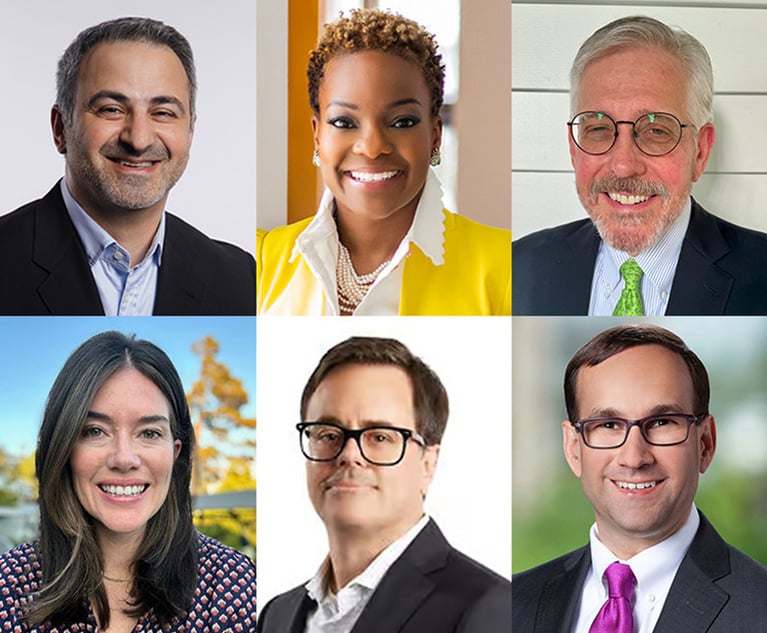 Burl Finkelstein, Kason Industries general counsel, standing inside the Eisenhower Executive Office Building next to the West Wing. Courtesy photo.
Burl Finkelstein, Kason Industries general counsel, standing inside the Eisenhower Executive Office Building next to the West Wing. Courtesy photo.General Counsel Discusses White House Meeting With Trade Officials
Burl Finkelstein, executive vice president and general counsel at Kason Industries Inc. in Georgia, was among the attendees of the annual trade conference for the Coalition for a Prosperous America last month.
April 11, 2019 at 03:56 PM
6 minute read
While trade tensions have left some companies feeling uneasy, especially those with a global footprint, others are applauding the Trump administration's “America First” stance. And a contingent of those supporters gathered at the White House last month during the Coalition for a Prosperous America annual trade conference.
The nonprofit organization's members were given access to several trade officials, including U.S. Trade Ambassador Robert Lighthizer and Peter Navarro, assistant to the president and director of the Office of Trade and Manufacturing Policy, along with a few lawmakers, including Sen. Marco Rubio.
One of the in-house leaders in attendance was Burl Finkelstein, executive vice president and general counsel at Kason Industries Inc. in Newnan, Georgia, which makes hardware for refrigeration and food service equipment.
Finkelstein spoke with Corporate Counsel Wednesday about his history with the coalition and his takeaways from the meeting. The conversation has been edited for clarity and length.
Corporate Counsel: What attracted you to the coalition?
Burl Finkelstein: I joined after I dropped out of NAM, the National Association of Manufacturers, because NAM somewhat refused to take a do-no-harm-to-domestic- manufacturers policy and trade position. The multinationals and globalist companies in NAM, which are the bigger companies there, wanted free trade and open borders and any advantage they can get. And the domestic manufacturers were going out of business. They were losing their customers. The globalist companies can game the system however it's set up, they can take advantage of it. And, typically, domestic producing companies can't take advantage of it. All they do is end up losing their market because they can't play in both directions very well.
CC: Which industries were represented at the meeting?
BF: CPA is a unique group because it's such a cross section of odd bedfellows. CPA represents domestic manufacturing, farmers and ranchers and it also represents organized labor, the AFL-CIO [American Federation of Labor and Congress of Industrial Organizations] and Teamsters have representatives in CPA. They're people who typically I wouldn't want to keep even at arm's length. But everybody has an interest in keeping jobs in America and benefiting American workers and keeping American industry productive and competitive.
CC: What were the highlights of the group's talks with Peter Navarro and Bob Lighthizer?
BF: They talked about Section 232 tariffs [on steel and aluminum], protecting the country for national security reasons, and about how the tariffs on steel and aluminum were working, actually. We talked about if the 232 tariffs should be expanded to other areas that are somewhat strategic to our economy and national security. We also talked about the USMCA [United States-Mexico-Canada Agreement] and, for the most part, we supported what was on the table presently.
With Navarro, we talked about the Reciprocal Trade Act, to try to get a bill through Congress that he's promoting, and we supported it, to review how trade is working with specific countries and then add tariffs where trade is getting out of balance. And if we didn't achieve balance in trade, we'd have mechanisms in place to take measures to achieve the balance. We're big supporters of that.
CC: What did they say about expanding 232 tariffs?
BF: If it was necessary to do it on specific things, electronics and things like that that were necessary for national security—the chips that went in cameras and things like that that the Chinese ended up having a back door into—those issues for national security should be addressed, possibly through tariffs.
CC: Was there talk about ratcheting up tariffs on China?
BF: That was one of the discussions, but since that's under negotiation now on a number of different fronts, we didn't really talk specifics about what's coming and not coming. But we talked a lot about the negotiations with China, which are still on despite what the media is talking about. China typically has been the biggest culprit in cheating on trade practice with the U.S.
CC: What did Rubio have to say?
BF: [Rubio] was inspiring to us, because a year ago he was an ardent free trader. And he gave a speech talking about how important it is for the U.S. to have production here, to make jobs here, to keep our economy up, to give people a step into the middle class by having those jobs. He gave a thoroughly encouraging and optimistic speech.
CC: Any revelations or surprises during the meeting?
BF: I was favorably impressed that the CPA group had so much access and credibility with the White House and with the people at the top of trade policy now. We started out really as a grassroots group. Now, the CEO, Michael Stumo, he can pick up the phone and talk to Dr. Navarro. Dan DiMicco, our chairman, was part of the transition team giving advice to the Trump cabinet on trade. [The meeting] reinvigorated me. I've been going to Washington, D.C., now for at least 15 years. And basically each time I go there to meet with our representatives and others, we're going there to beg them not to take further actions that are going to cause us to lose our livelihood, and some agree with us and some don't, but it's usually going back every year and saying I've managed to keep this business another year and please don't do anything that promotes offshoring, that takes our business away.
Read More:
This content has been archived. It is available through our partners, LexisNexis® and Bloomberg Law.
To view this content, please continue to their sites.
Not a Lexis Subscriber?
Subscribe Now
Not a Bloomberg Law Subscriber?
Subscribe Now
NOT FOR REPRINT
© 2025 ALM Global, LLC, All Rights Reserved. Request academic re-use from www.copyright.com. All other uses, submit a request to [email protected]. For more information visit Asset & Logo Licensing.
You Might Like
View All
'Be Comfortable Being Uncomfortable': Pearls of Wisdom From 2024 GC Q&As



Kraft Heinz Hires GC of Industrial Manufacturer as Legal Chief
Trending Stories
- 1Restoring Trust in the Courts Starts in New York
- 2'Pull Back the Curtain': Ex-NFL Players Seek Discovery in Lawsuit Over League's Disability Plan
- 3Tensions Run High at Final Hearing Before Manhattan Congestion Pricing Takes Effect
- 4Improper Removal to Fed. Court Leads to $100K Bill for Blue Cross Blue Shield
- 5Michael Halpern, Beloved Key West Attorney, Dies at 72
Who Got The Work
Michael G. Bongiorno, Andrew Scott Dulberg and Elizabeth E. Driscoll from Wilmer Cutler Pickering Hale and Dorr have stepped in to represent Symbotic Inc., an A.I.-enabled technology platform that focuses on increasing supply chain efficiency, and other defendants in a pending shareholder derivative lawsuit. The case, filed Oct. 2 in Massachusetts District Court by the Brown Law Firm on behalf of Stephen Austen, accuses certain officers and directors of misleading investors in regard to Symbotic's potential for margin growth by failing to disclose that the company was not equipped to timely deploy its systems or manage expenses through project delays. The case, assigned to U.S. District Judge Nathaniel M. Gorton, is 1:24-cv-12522, Austen v. Cohen et al.
Who Got The Work
Edmund Polubinski and Marie Killmond of Davis Polk & Wardwell have entered appearances for data platform software development company MongoDB and other defendants in a pending shareholder derivative lawsuit. The action, filed Oct. 7 in New York Southern District Court by the Brown Law Firm, accuses the company's directors and/or officers of falsely expressing confidence in the company’s restructuring of its sales incentive plan and downplaying the severity of decreases in its upfront commitments. The case is 1:24-cv-07594, Roy v. Ittycheria et al.
Who Got The Work
Amy O. Bruchs and Kurt F. Ellison of Michael Best & Friedrich have entered appearances for Epic Systems Corp. in a pending employment discrimination lawsuit. The suit was filed Sept. 7 in Wisconsin Western District Court by Levine Eisberner LLC and Siri & Glimstad on behalf of a project manager who claims that he was wrongfully terminated after applying for a religious exemption to the defendant's COVID-19 vaccine mandate. The case, assigned to U.S. Magistrate Judge Anita Marie Boor, is 3:24-cv-00630, Secker, Nathan v. Epic Systems Corporation.
Who Got The Work
David X. Sullivan, Thomas J. Finn and Gregory A. Hall from McCarter & English have entered appearances for Sunrun Installation Services in a pending civil rights lawsuit. The complaint was filed Sept. 4 in Connecticut District Court by attorney Robert M. Berke on behalf of former employee George Edward Steins, who was arrested and charged with employing an unregistered home improvement salesperson. The complaint alleges that had Sunrun informed the Connecticut Department of Consumer Protection that the plaintiff's employment had ended in 2017 and that he no longer held Sunrun's home improvement contractor license, he would not have been hit with charges, which were dismissed in May 2024. The case, assigned to U.S. District Judge Jeffrey A. Meyer, is 3:24-cv-01423, Steins v. Sunrun, Inc. et al.
Who Got The Work
Greenberg Traurig shareholder Joshua L. Raskin has entered an appearance for boohoo.com UK Ltd. in a pending patent infringement lawsuit. The suit, filed Sept. 3 in Texas Eastern District Court by Rozier Hardt McDonough on behalf of Alto Dynamics, asserts five patents related to an online shopping platform. The case, assigned to U.S. District Judge Rodney Gilstrap, is 2:24-cv-00719, Alto Dynamics, LLC v. boohoo.com UK Limited.
Featured Firms
Law Offices of Gary Martin Hays & Associates, P.C.
(470) 294-1674
Law Offices of Mark E. Salomone
(857) 444-6468
Smith & Hassler
(713) 739-1250






